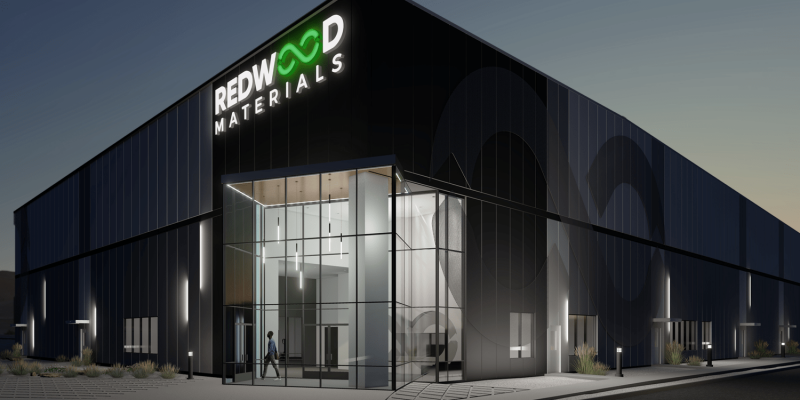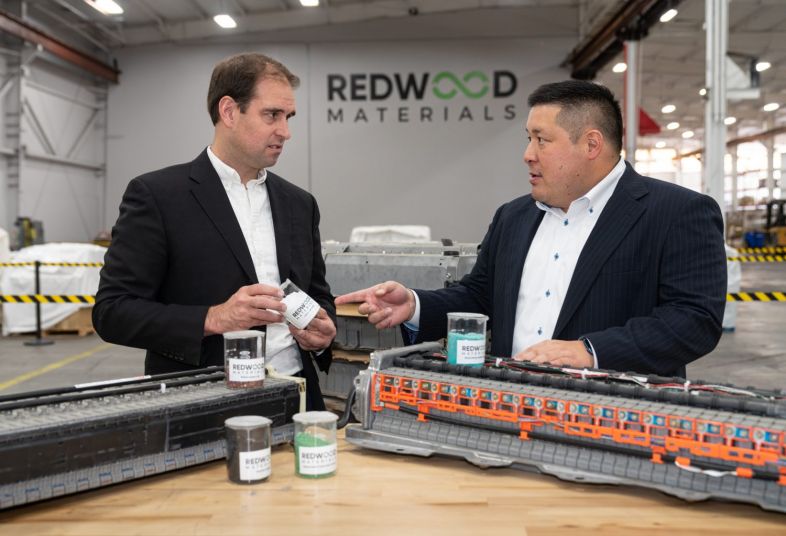Toyota to Collaborate with Redwood Materials to Build a Closed Loop, EV Battery Recycling Ecosystem in the U.S.
【Summary】Toyota Motor North America announced a new collaboration with electric vehicle battery recycling startup Redwood Materials, a company founded by Tesla co-founder J.B. Straubel. The two companies plan to build an entire closed loop ecosystem for the recycling batteries from Toyota’s future hybrid and fully-electric vehicles.

Automaker Toyota Motor North America announced a new collaboration with electric vehicle battery recycling startup Redwood Materials, a company founded by Tesla co-founder J.B. Straubel. The two companies plan to build an entire closed loop ecosystem for the recycling batteries from Toyota's future hybrid and fully-electric vehicles.
The collaboration will include the collection, testing and recycling of used vehicle batteries into raw materials to create a sustainable supply chain. Toyota and Redwood Materials also aim to develop second-life opportunities for remanufactured and repurposed hybrid electric vehicle batteries by leveraging battery health screening tools and data from its vehicles.
Toyota and Redwood Materials will aim to incorporate battery recycling through domestic battery materials manufacturing into the automaker's battery production strategy, beginning with North America.
The collaboration with Redwood will support Toyota's commitment to reduce its environmental footprint and achieve carbon neutrality by 2050.
"We are excited to be working with Redwood Materials to identify solutions for our electrified powertrains at the end-of-life that contributes to our vision of creating a sustainable, circular battery ecosystem," said Christopher Yang, group vice president of Business Development at Toyota. "We are committed to developing sustainable solutions that allow our batteries to provide value beyond the initial lifecycle in an electrified vehicle. This also contributes to our carbon neutrality goals and our mission to build a more sustainable world for all."
Redwood Materials was founded in 2017 by Straubel, who co-founded electric automaker Tesla with Martin Eberhard and Marc Tarpenning before Elon Musk joined the company. Straubel served as Tesla's first Chief Technical Officer (CTO) and fifth employee. Although he left Tesla in 2019, Straubel started Redwood Materials while still working for the electric automaker.
Redwood believes that in order to make electric vehicles sustainable and truly affordable, solutions for the collection, recycling and remanufacturing end-of-life battery packs into new battery materials needs to be established.
Although the auto industry is still in the early stages of electrification, as the number end-of-life battery packs grows, Redwood Materials expects that batteries at the end of their service lift will become valuable assets.
Redwood Materials battery recycling strategy helps reduce the environmental footprint and cost of lithium-ion batteries by offering large-scale sources of domestic anode and cathode materials produced from recycled batteries.
Redwood currently receives more than 6 GWh of end-of-life batteries each year for recycling, which are then refined and remanufactured into anode foil and cathode active materials, which are the positive and negatively charged components of a battery that store electrictricity.
Redwood plans to ramp production of anode and cathode components in the US to 100 GWh annually by 2025, which is enough to supply more than one million electric vehicles a year. By 2030, the startup expects its output to scale to 500 GWh/year, which is enough to produce batteries for around 5 million electric vehicles.
"Toyota helped pave the way for clean transportation with the introduction of the Toyota Prius more than 20 years ago. Their commitment not only to sell millions of electrified vehicles this decade but to ensure their circularity into the future is a critical step for electrification," said JB Straubel, Redwood Materials founder and CEO. "Redwood and Toyota's shared vision to drive down the environmental footprint and cost of transportation will continue to accelerate the adoption and access to electric vehicles."

Redwood Materials founder J.B. Straubel (left) and Toyota's group vice president of Business Development Christopher Yang.
In 2019, Tesla's battery partner Panasonic entered into a partnership with Redwood Materials to reclaim all of the scrap materials generated from producing battery cells at Tesla's gigafactory in Nevada. Currently all of the scrap materials generated by battery production are shipped to Redwood's nearby Nevada facility for recycling.
Redwood says its EV battery recycling technology can recover, on average, more than 95% of the elements like nickel, cobalt, lithium and copper. Once recycled, these materials can be reused to produce anode and cathode active materials for future batteries.
In July 2021, Redwood Materials announced a $700 million investment it's using to build a battery materials factory in the U.S.
Redwood is also working with Ford Motor Co on battery recycling. In Sept 2021, the company announced its partnership with Ford to establish electric vehicle battery recycling operations and a domestic battery supply chain.
Ford and Redwood's collaboration will integrate battery recycling into Ford's domestic EV battery strategy, as the automaker develops more purely electric vehicles like the Mustang Mach-E and Ford F-150 Lightning.
The goal of Redwood's partnership with Ford is to make electric vehicles more sustainable and drive down the cost for batteries by creating a closed-loop recycling ecosystem. But it will also help Ford reduce its reliance on imported EV batteries and the mining of raw materials, which can also help to lower costs.
The high cost of EV batteries is one of the barriers to the widespread adoption of electrified vehicles. Although battery production costs have fallen significantly over the years, it still costs automakers roughly $140 for each kWh of battery power. Tesla's 2022 Model 3 Long Range, for example, comes with a 82 kWh battery pack, which translates to around $11,480.
Toyota's EV plans include new and increased automotive battery production in the U.S. The automaker recently announced an investment of $1.3 billion in a new North American battery factory named "Toyota Battery Manufacturing, North Carolina" (TBMNC). When completed, TBMNC is anticipated to produce battery packs for 1.2 million electrified vehicles per year.
Toyota expects to sell eight million electrified vehicles globally by 2030, which includes an investment of roughly $70 billion to develop new battery-powered models.
In 2020, Straubel said he wants Redwood Materials to become the world's top EV battery recycler.
In February, Redwood announced plans to launch a comprehensive battery recycling program in California, the state with the highest number of EVs on the road. Ford and Volvo Cars were the first automakers to directly support the program. However, Redwood said it will accept all lithium-ion (Li-ion) and nickel metal hydride (NiMH) batteries in the state and welcomes other automakers to join in its recycling efforts in California.
-


Ford is Testing a New Robotic Charging Station to Assist Drivers of EVs With Disabilities
-


Ford Raises the Prices of the F-150 Lightning Electric Pickup Due to Rising Raw Material Costs
-


The BMW 7-Series to Feature HD Live Maps From HERE Technologies for Hands-Free Highway Driving in North America at Speeds up to 80 MPH
-


AutoX to Use the 'Eyeonic Vision Sensor' from California-based SiLC Technologies for its Robotaxi Fleet in China
-


LG Develops ‘Invisible’ Speaker Sound Technology That Could Revolutionize In-Vehicle Audio
-


Researchers at South Korea’s Chung-Ang University Develop a ‘Meta-Reinforcement’ Machine Learning Algorithm for Traffic Lights to Improve Vehicle Throughput
-


Zeekr’s New 009 Electric Passenger Van is the World’s First EV to Feature CATL’s Advanced ‘Qilin’ Battery With a Range of 510 Miles
-


Redwood Materials is Building an Electric Vehicle Battery Recycling Facility in South Carolina
- Toyota to Collaborate with Redwood Materials to Build a Closed Loop, EV Battery Recycling Ecosystem in the U.S.
- BMW to Test a New Battery in the iX Electric SUV Developed By Michigan Startup Our Next Energy Inc. That Can Deliver 600 Miles of Range
- China’s Geely Launches the First of 9 Low Earth Orbit Satellites That Will Help Guide its Autonomous Cars
- Tesla’s Battery Supplier Panasonic is Working on New EV Battery Technology That Can Boost Range by 20%
- Toyota’s New ‘Intelligent Assistant’ Learns Voice Commands and Gets Smarter Over Time Using Machine Learning
- Tesla's Battery Supplier CATL Unveils its New ‘Qilin’ Battery That Can Deliver 600+ Miles of Range to EVs
- BorgWarner to Supply its Integrated Drive Module to Hyundai for a New EV That Will Enter Production in 2024
- GM Expanding First Responder Training Program for EV Crashes
- Audi Hits EV Startup NIO With a Trademark Lawsuit Over its Vehicle Naming
- EV Startup VinFast is Offering 3 Years of Free EV Charging and Advanced Driver Assist System for Customers That Reserve a Vehicle Through Sept 30











 About Us
About Us Contact Us
Contact Us Careers
Careers